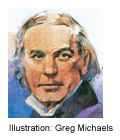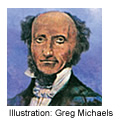Wilhelm Loehe never left his native Germany, yet his untiring work for the Kingdom helped the young LCMS—and Lutheran churches around the world.
by Rev. John T. Pless
 Born in the Bavarian village of Fürth on Feb. 21, 1808, Johann Konrad Wilhelm Loehe would never see the ocean. Yet without leaving Germany, his missionary efforts would bear rich fruits in North and South America, as well as in Australia. Because of his untiring zeal for the Gospel and his unwavering commitment to Lutheran missions, congregations were planted that are today part of The Lutheran Church—Missouri Synod. Concordia Theological Seminary in Fort Wayne is a direct result of his vision.
Born in the Bavarian village of Fürth on Feb. 21, 1808, Johann Konrad Wilhelm Loehe would never see the ocean. Yet without leaving Germany, his missionary efforts would bear rich fruits in North and South America, as well as in Australia. Because of his untiring zeal for the Gospel and his unwavering commitment to Lutheran missions, congregations were planted that are today part of The Lutheran Church—Missouri Synod. Concordia Theological Seminary in Fort Wayne is a direct result of his vision.
The Synod’s deaconess program, as well as the flourishing works of mercy carried out by the LCMS World Relief and Human Care bear the imprint of his influence. The Lutheran Service Book contains one of Loehe’s hymns, a testimony to the depth of his love for the Lord’s Supper as the holy food that sustains the church: “Wide Open Stand the Gates”(LSB 639).
Who was this man, who by the grace of God accomplished so much for the sake of the Kingdom from his isolated little corner of the world?
Bereaved of his father at the age of eight, Loehe was raised by a mother whose pious hope it was that her son would become a pastor. Influenced also by the reverent example of his village pastor, Loehe would fulfill his mother’s wish. After university studies at Erlangen, he was ordained on July 25, 1831.
The young pastor quickly gained a reputation as a powerful preacher and tender shepherd to the sick and the aged. He was known for his unflinching devotion to the old ways of church life marked by adherence to the Lutheran Confessions rather than the Rationalism so prominent in early 19th-century German church life. He soon found himself the object of vicious opposition as a separatist and a mystic. He was finally relieved of his responsibilities at Kirchenlamnitz and, after a series of temporary assignments, eventually called to Neuendettelsau. Although Loehe said that Neuendettelsau was not a fit place to bury a dog, he would remain there for the rest of his life.
If church officials thought they could sequester this troublesome young pastor into insignificance, they were mistaken. Newly married to Helene, a confirmand from a previous parish, Loehe threw himself into his work in “the quiet wilderness” as he called it. After six years of marriage his beloved Helene would die at the age of 24, leaving her husband with four young children. The youngest son would die a year after his mother.
Loehe would never get over his wife’s death. His loneliness and grief leave their footprints in his writings, especially a yearning for the fulfillment of the communion of saints in heaven. The vacuum created by the death of his wife was filled with even more intense devotion to pastoral work, theological writing, and the organization of missionary works and works of mercy.
Beyond the confines of his parish, his reputation as a preacher grew, leading one scholar to call Loehe “the Chrysostom of his century.” Loehe understood the Divine Service as the place where the Heavenly Bridegroom meets His Bride. He sought to recover the best liturgical practices of previous centuries so that the congregation would be dressed, not in the threadbare worship forms of Pietism and Rationalism, but in the splendor that befits the Bride of Christ. For Loehe, the center of the church was the liturgy of Word and Supper, and from this lively and life-giving center, every aspect of the church’s life radiated.
Loehe would have a hard time understanding those in our day who would pit “mission” against “liturgy.” For him the missional church was a liturgical church. One of his oft-quoted statements is “mission is nothing but the one church of God in motion.” This motion is not a frenzied activism but the movement of Christ to His people in Word and Sacrament and the movement of those who receive Christ’s gifts out into the world with the message of salvation. Loehe’s commitment to mission cannot be understood without reference to the liturgy.
This commitment to mission is evident in Loehe’s response to the plea of a German-American pastor, Friedrich Wyneken, in 1840. Wyneken, who would serve as our Synod’s second president, told of the plight of Germans living in scattered settlements on the frontier without church or pastor. Troubled by stories of Lutherans being seduced into the sects or losing their faith altogether, Loehe responded by collecting funds and books and  recruiting two craftsmen, Adam Ernst and Georg Burger, to study with him and then be sent to America as “emergency helpers.”
recruiting two craftsmen, Adam Ernst and Georg Burger, to study with him and then be sent to America as “emergency helpers.”
Others would follow, including colonists who would settle in the Saginaw Valley of Michigan and form strong Lutheran communities such as Frankenmuth. Disappointed by the lack of commitment to Lutheran doctrine that Loehe’s men found in other Lutheran bodies, they would find in C.F.W. Walther and the Saxons men who shared their loyalty to the Scriptures and the Confessions. When the Missouri Synod was established in Chicago in 1847, more than half of its pastors were men sent by Loehe. But even before the Synod was organized, Loehe had already proven instrumental in the founding of a seminary in Fort Wayne.
Ultimately an unfortunate rift between Loehe and Walther, the Synod’s founding president, would develop over understandings of church and ministry. The well-known theologian, Hermann Sasse, remarked that this division was the great tragedy of 19th-century Lutheranism. The Missouri Synod and Loehe would go their separate ways, but the positive influence of Loehe would remain a vital part of our Synod’s history.
There is much to be learned from Loehe. For him, doctrinal indifference meant the death of Christianity. Tempting as it might be to downplay doctrinal distinctions on the mission field, Loehe knew that such an approach was a dead end. It could only lead to the destruction of the church, for it would rob Christians of the certainty of salvation that Christ gives us in the pure preaching of His Word. It would deprive Christians of the comfort of knowing that Jesus gives them His body and blood in the Sacrament of the Altar. Doctrinal disunity destroys the basis for genuine mission. Pure doctrine and energetic mission go hand in hand for Loehe.
In the face of opposition from church leaders who had forsaken their allegiance to the Lutheran Confessions, Loehe stood firm even though it meant he would be denied more prestigious calls. He settled for an out-of-the-way town and transformed it into a center of churchly activity that would not only include a parish church, but also a deaconess house, an orphanage, a home for the aged, and a mission school.
His vision for confessional Lutheranism was global. Loehe dreamed that his colonists in the Saginaw Valley might attract Indians to Christ by the witness of their communal life. He also dreamed of missionary work among the Chinese in California. Although circumstances prevented these dreams from coming to fruition, pastors from Neuendettelsau would ultimately come, not only to North and South America, but also to Australia, New Guinea, and other parts of Europe to spread the saving Word of Christ and plant the church.
It is no wonder then that Christian Weber, a German Loehe scholar, suggests that without Loehe and his co-workers the number of Lutherans in the world today might be cut in half. Loehe had a heart for mission shaped by His love for the church and a longing for that heavenly city populated by people from every tribe and tongue. Even though he never left home, he was a missionary whose example is worthy of respect and emulation.
For Additional Reading
- Moving Frontiers, edited by Carl S. Meyer (CPH, 1964, 1986).
- Confession and Mission, Word and Sacrament: The Ecclesial Theology of Wilhelm Loehe by David Ratke (CPH, 1973).
- Love Leaves Home: Wilhelm Loehe and the Missouri Synod by Erich H. Heintzen (CPH, 1973).
- Loehe on Mercy, tr. by Holger Sonntag; ed. by Adriane Dorr and Philip Hendrickson (LCMS World Relief and Human Care, 2007).
C.F.W. Walther on Loehe
‘Next to God, it is Pastor Loehe to whom our Synod is indebted for its happy beginning and rapid growth in which it rejoices; it may well honor him as its spiritual father. It would fill the pages of an entire book to recount even briefly what for many years this man, with tireless zeal in the noblest unselfish spirit, has done for our Lutheran Church and our Synod in particular.’
—Quoted by Erich H. Heintzen in Love Leaves Home: Wilhelm Loehe and the Missouri Synod (CPH, 1973), p 73.






Pingback: January Issue of the Liturgical Living Periodical | The Homemaking Muench